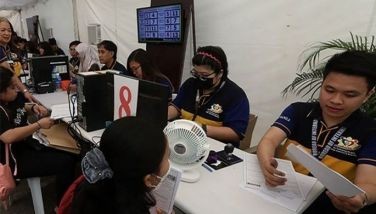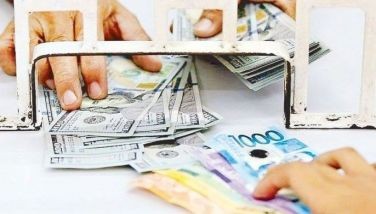‘Are you vaccinated?’

The question has been a sign of concern, especially if the person being asked is a senior citizen or one who has health issues that pose risks of being severely ill of COVID-19.
Lately though, as nations increasingly become impatient of the seemingly endless cycle of quarantines or of wearing masks and face shields, of avoiding going shoulder-to-shoulder with colleagues or getting repulsed of the smell of disinfectants, the question had started to sound threatening.
In fact, there is debate now whether vaccination passports should be made compulsory for travel, especially if one needs to pass through border controls. This is just a few steps away from requiring people to have a vaccination passport when getting on public buses or trains, even if it’s just moving around the metro.
In the Philippines, with a number of big employers buying vaccines to be given free to their employees, the issue of mandatory vaccinations in the work site has likewise surfaced, and while it seems to matter only to a minority, this still poses some problems.
New guidelines in other cities outside the Philippines with high numbers of vaccination, for example, now allow groups of fully vaccinated individuals to dine indoors without adhering to the old rules. This effectively curtails the social mobility options of people who are not vaccinated, which could be heart-wrenching, especially if the decision not to have the jab is borne of health or religious reasons.
Growing social divide
The social divide between vaccinated and unvaccinated is also growing in determining who can go to public events like concerts, conventions, and sporting matches, where those with jabs increasingly demand that all others attending be equally immunized.
It is also being reflected as social inequalities, as in the now-paused proposal in Hong Kong to mandate vaccinations on all migrant workers. The move is viewed as “discriminatory and unjust” by human rights activists, although the government claims it is meant to protect citizens’ rights and good health.
In Hong Kong, where there is significant number of Filipino workers taking on jobs as housemaids, cries of discrimination are based on the fact that just 12 percent of its population has had the jab, and that foreign white collar workers have not been singled out for mandatory vaccination.
In Japan, where vaccination hesitancy grips a high 52 percent of the population, the scheduled Tokyo 2020 Olympics is unleashing its own peculiar emotions ahead of the July 23 opening where tens of thousands of foreign visitors are expected to attend.
Japan, with its significantly aged population, is currently grappling with a fresh surge of infections. Fear of vaccinations has its roots in the serious side effects of immunization of children for measles, mumps, and rubella (MMR) in the 1980s to the 1990s.
Speaking of children, one emerging discussion on COVID-19 vaccination is the immunization at certain levels as a prerequisite to enrolment. Policy guidelines are being drawn up in a number of US cities in preparation for the reopening of face-to-face classes this year.
The faster normalization of learning in developed economies once more highlights the growing gap between the vaccinated and unvaccinated. For the Philippines, with herd immunity targets pushed back further because of recent delays in vaccine delivery, normal classroom learning for many will likely be deferred to 2022. That’s another year lost.
Passport apps
Going back to the topic of vaccination passports, the hot issue nowadays, especially in countries where governments tend to overextend their authorities to secure their citizens’ personal information through digital means, is the growing proliferation of passport apps.
It’s not just a matter of divulging when you have had your first and second doses, and what brand of vaccine was jabbed on you, but sometimes even what health issues you have had or currently are afflicted with. Don’t forget also that a “credible” vaccination passport will need your address, photo, contact details, and some legitimate government-issued ID number like your passport or driver’s license.
When you hand this over to an immigration officer as you seek entry in a foreign country, this shouldn’t be as distressing compared to when this is handled by a clerk manning the ticket dispensing station at a stadium or worse, the waiter who’s going to show you your dining table at a restaurant.
Too much information divulged to people who may mishandle your personal data is a creepy thought. Imagine how abused one may feel when, after dining in an all-vegan restaurant, your smartphone suddenly spouts dozens of other possible vegetarian restaurants to go to.
One may argue that this is part and parcel of the process that the world has to go through until this pandemic is stomped dead with finality, but the threat of new deadlier variants – or even a totally different pandemic-inducing virus – does not bode any comfort.
Even if we do get back to the old, normal life we left behind early last year, all of our personal information mined by various apps will likely stay in databases stored in some cloud-based storage, waiting to be dissected and used by people or companies or governments without our expressed consent.
The pandemic has accelerated our romance with the digital world, opening new channels that were beyond our imagination a year ago. Sometimes, though, this romance blinds us into giving much too much information (TMI) and could be detrimental to our overall security in the long term. Let’s not bring our guards down unnecessarily by dishing out TMI.
Facebook and Twitter
We are actively using two social networking websites to reach out more often and even interact with and engage our readers, friends and colleagues in the various areas of interest that I tackle in my column. Please like us on www.facebook.com/ReyGamboa and follow us on www.twitter.com/ReyGamboa.
Should you wish to share any insights, write me at Link Edge, 25th Floor, 139 Corporate Center, Valero Street, Salcedo Village, 1227 Makati City. Or e-mail me at [email protected]. For a compilation of previous articles, visit www.BizlinksPhilippines.net.
- Latest
- Trending


























